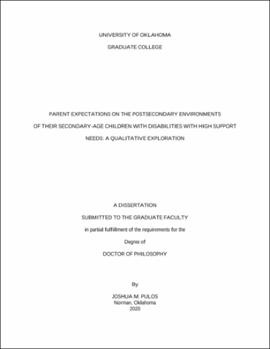| dc.contributor.advisor | Williams-Diehm, Kendra | |
| dc.contributor.author | Pulos, Joshua | |
| dc.date.accessioned | 2020-05-19T15:28:42Z | |
| dc.date.available | 2020-05-19T15:28:42Z | |
| dc.date.issued | 2020-05-08 | |
| dc.identifier.uri | https://hdl.handle.net/11244/324419 | |
| dc.description.abstract | The purpose of the Individuals with Disabilities Education Act (2004) is to prepare students with disabilities for postsecondary (a) education, (b) employment, and (c) independent living. Researchers in the field of secondary transition have been working to provide teachers with evidence-based practices and evidence-based, in-school predictors of postsecondary success to utilize in their classrooms (Kohler, 1993, 1996; Test, Fowler et al., 2009; Test, Mazzotti et al., 2009). These practices and predictors are meant to bolster the postsecondary outcomes for these students. Nevertheless, students with disabilities, specifically students with disabilities with high support needs, continue to leave high school unprepared for the challenges of adult life and are attaining success at lower rates than their peers without disabilities. However, could a newly identified predictor—parent expectations (Mazzotti et al., 2016)—provide the key to postsecondary success?
By employing a general qualitative inquiry design (Creswell & Poth, 2017), I explored parent expectations on the postsecondary environments of their secondary-age children with disabilities with high support needs. Three research questions guided my study: (1) What are parent expectations on the postsecondary environments (i.e., education, employment, and independent living) of their secondary-age children with disabilities with high support needs?; (2) Do parent expectations on the postsecondary environments (i.e., education, employment, and independent living) of their secondary-age children with disabilities with high support needs vary across the level of supports needed by their children? If so, how?; and (3) How are parent expectations on the postsecondary environments (i.e., education, employment, and independent living) of their secondary-age children with disabilities with high support needs shaped (e.g., in-school influences, outside influences, personal learning history)?
The data source were derived from in-depth, semi-structured interviews, where I interviewed 16 parents. With the guidance of Morse’s (1994) cognitive processes of qualitative analysis, I subjected all transcripts to inductive and thematic analysis developed by LeCompte and Preissle (1993) and Shank (2002). A multitude of themes and sub-themes emerged from my data analytic schema: (a) Research Question 1, magnitude across and within postsecondary environments, employment first, educational training for employment success, college experience, leaving the nest; (b) Research Question 2, variant of postsecondary education supports, variant of postsecondary employment supports, variant of postsecondary independent living supports; and (c) Research Question 3, postsecondary expectations shaped by my secondary-age child, postsecondary expectations shaped by outside forces, postsecondary expectations shaped by in-school interactions. Implications for practice and future research are discussed as well as study limitations. | en_US |
| dc.language | en_US | en_US |
| dc.subject | Education, Special. | en_US |
| dc.subject | In-School, Evidence-Based Predictors of Postsecondary Success | en_US |
| dc.subject | Parent Expectations | en_US |
| dc.subject | Students with Significant Disabilities | en_US |
| dc.subject.lcsh | Children with mental disabilities--Vocational education--United States--Public opinion | |
| dc.subject.lcsh | Developmentally disabled children--Vocational education--United States--Public opinion | |
| dc.subject.lcsh | People with mental disabilities--United States--Economic conditions--Public opinion | |
| dc.subject.lcsh | Developmentally disabled--United States--Economic conditions--Public opinion | |
| dc.subject.lcsh | People with mental disabilities--Rehabilitation--United States--Public opinion | |
| dc.subject.lcsh | Developmentally disabled--Rehabilitation--United States--Public opinion | |
| dc.subject.lcsh | School-to-work transition--United States--Public opinion | |
| dc.subject.lcsh | Parents of children with mental disabilities--United States--Attitudes | |
| dc.subject.lcsh | Parents of developmentally disabled children--United States--Attitudes | |
| dc.subject.lcsh | Public opinion--United States | |
| dc.title | Parent Expectations on the Postsecondary Environments of their Secondary-Age Children with Disabilities with High Support Needs: A Qualitative Exploration | en_US |
| dc.contributor.committeeMember | Jones, John | |
| dc.contributor.committeeMember | Hong, Ji | |
| dc.contributor.committeeMember | Peltier, Corey | |
| dc.date.manuscript | 2020-04-19 | |
| dc.thesis.degree | Ph.D. | en_US |
| ou.group | Jeannine Rainbolt College of Education::Department of Educational Psychology | en_US |
| shareok.orcid | 0000-0002-0269-0995 | en_US |
| shareok.nativefileaccess | restricted | en_US |
